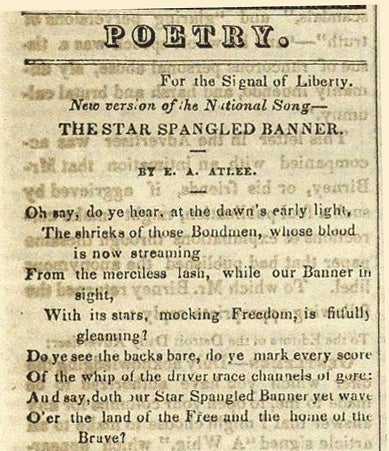In the 19th-century, the music and words known today as the national anthem of the United States —”The Star-Spangled Banner”—was deeply associated with American identity but just one of many patriotic songs. All of America’s patriotic songs were part of an ongoing cultural dialogue known as the broadside ballad tradition. New lyrics were written to these traditional tunes and published in newspapers. The alloy of new words and well known patriotic music might create a presidential campaign song or be used to

celebrate a holiday like the Fourth of July. They might also express social protest to comment on issues of the day such as the right of women to vote or the evils of alcohol.
I’ve identified more than 100 sets of lyrics sung to the tune of “The Star-Spangled Banner,” some of which predate Key’s now famous lyric and others which follow and parody Key’s words. The most powerful of these lyrics and the most emblematic of the tune’s potential for social commentary is the 1844 anti-slavery lyric “Oh Say, Do You Hear?” by E. A. Atlee. It was first published in the abolitionist newspaper Signal of Liberty (July 22, 1844) and later that same year in William Lloyd Garrison’s more famous national anti-slavery paper The Liberator (Sept. 13, 1844).
https://youtu.be/88Kmp90SGFw?t=20s
Atlee’s words echo Key’s own, creating a recriminating tension between often graphic descriptions of the slavery’s inhuman bondage on one hand and the ideals of freedom celebrated in “The Star-Spangled Banner” on the other. Atlee’s lyric thus questions how a nation that permits slavery can in any sense be a “land of the free” at all, indicting the country as hypocritical and demanding the end of slavery. Atlee’s lyric is among the most powerful ever to be written to this melody and could be taught alongside Key’s own to highlight the responsibility that all Americans have to make certain that the ideals of freedom upon which the nation was founded are not taken for granted, but rather apply to all.
The complete lyrics of Atlee’s “New National Anthem” are:
- Oh, say do you hear, at the dawn’s early light,
The shrieks of those bondmen, whose blood is now streaming
From the merciless lash, while our banner in sight
With its stars, mocking freedom, is fitfully gleaming?
Do you see the backs bare? Do you mark every score
Of the whip of the driver trace channels of gore?
And say, doth our star-spangled banner yet wave
O’er the land of the free, and the home of the brave? - On the shore, dimly seen thro’ the mists of the deep,
Where Afric’s race in false safety reposes,
What is that which the breeze, o’er the towering steep,
As it heedlessly sweeps, half conceals, half discloses?
’Tis a slave ship that’s seen, by the morning’s first beam,
And its tarnished reflection pollutes now the stream:
’Tis our star-spangled banner! Oh! When shall it wave
O’er the land of the free, and the home of the brave! - And where is the band, who so valiantly bore
The havoc of war, and the battle’s confusion,
For Liberty’s sweets? We shall know them no more:
Their fame is eclispsed by foul Slavery’s pollution.
No refuge is found on our unhallowed ground,
For the wretched in Slavery’s manacles bound;
While our star-spangled banner in vain boasts to wave
O’er the land of the free, and the home of the brave! - Shall we ne’er hail the day when as freemen shall stand
The millions who groan under matchless oppression?
Shall Liberty’s shouts, in our heaven-rescued land,
Ne’er be shared by the slave in our blood-guilty nation?
Oh, let us be just, ere in God we dare trust;
Else the day will o’er take us when perish we must;
And our star-spangled banner at half mast shall wave
O’er the death-bed of Freedom—the home of the slave.
P.S. “Oh Say, Can You Hear?” and 36 other tracks that tell the story of “The Star-Spangled Banner” from its origins as a London club song up through Igor Stravinsky’s arrangement can be heard on the Poets and Patriots recording project and the sheet music for these and other Banner songs is in our Star Spangled Songbook.

